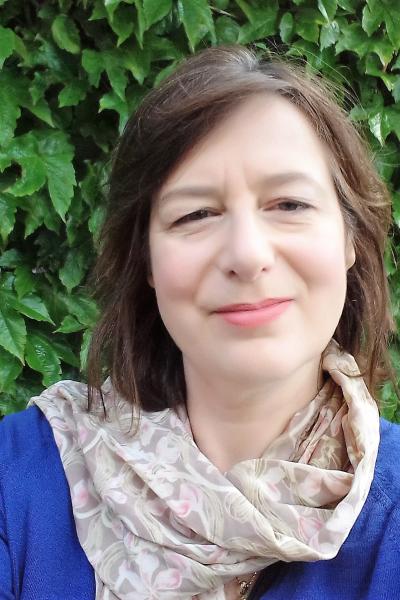Emma Clery
Professor of English literature at Engelska institutionen
- Telephone:
- +46 18 471 12 50
- E-mail:
- emma.clery@engelska.uu.se
- Visiting address:
- Engelska parken, Thunbergsvägen 3 L
- Postal address:
- Box 527
751 20 Uppsala
Download contact information for Emma Clery at Engelska institutionen
More information is available to staff who log in.
Short presentation
Emma Clery is Professor in the Department of English Literature at the Uppsala University. She specialises in British Literature of the 18th and 19th Centuries, print culture, women’s writing and the cultural history of economics.
Current projects include a study of the early feminist Mary Wollstonecraft for Oxford University Press, and an article on eighteenth-century literature for the Cambridge Companion to Literature and Economics.
Biography
Emma Clery has previously worked at Keele University, and at Sheffield Hallam University in the post of Senior Research Fellow with the AHRB-funded Corvey Project on Romantic-Era Women’s Writing. From 2005 to 2020 she held the position of Professor of Eighteenth-Century English Literature at University of Southampton, with responsibilities for developing the link with Chawton House Library, a centre for the study of early women’s writing with a unique collection of rare books. For the period 2013 to 2016 she was awarded a Leverhulme Trust Major Fellowship, resulting in the publication of two books, Eighteen Hundred and Eleven: Poetry, Protest and Economic Crisis (Cambridge University Press, 2017; winner of the British Academy Rose Crawshay Prize 2018), and Jane Austen: The Banker’s Sister (Biteback, 2017).
Research
Current research interests include Jane Austen, Mary Wollstonecraft, and economics and literature from 1700 to 1830.
Past publications include:
Books
Mary Wollstonecraft: A Very Short Introduction (Oxford University Press, forthcoming 2021).
Jane Austen: The Banker’s Sister (Biteback, 2017).
Eighteen Hundred and Eleven: Poetry, Protest and Economic Crisis (Cambridge University Press, 2017).
The Feminization Debate in Eighteenth-Century England: Literature, Commerce and Luxury (Palgrave Macmillan, 2004).
Women’s Gothic from Clara Reeve to Mary Shelley, ‘Writers and Their Work’ series, gen. ed. Isobel Armstrong (Northcote House Press / The British Council, 2000).
The Rise of Supernatural Fiction, 1762-1800 (Cambridge University Press, 1995).
Edited Works
Ed. with Peter Garside and Caroline Franklin, Authorship, Commerce, and the Public: Scenes of Writing 1750-1850 (Palgrave Macmillan, 2002).
Ed. with Robert Miles, Gothic Documents 1700-1820 (Manchester University Press, 2000).
Ed., Ann Radcliffe, The Italian, rev. edn. (Oxford World’s Classics, 1998).
Ed., Horace Walpole, The Castle of Otranto, rev. edn. (Oxford World's Classics, 1996).
Articles and Book Chapters (since 2000)
‘Mary Wollstonecraft: A Feminist Exile in Paris,’ Literaria Pragensia, 29: 57 (2019), 29-46; open access.
‘Conversations on Political Economy in Sanditon,’ Persuasions Online, 38:2 (Spring, 2018); open access.
‘‘‘That is Capital”: Views of London in Pride and Prejudice’, in Jane Austen’s Geographies, ed. Robert Clark (Routledge, 2017), pp. 156-74.
‘Free Market Feminism? The Political Economy of Women’s Writing,’ in Women's Writing 1660-1830: Feminisms, Fictions and Futures ed. Jennie Batchelor and Gillian Dow (Palgrave Macmillan, 2017), pp. 33-50.
‘Anna Letitia Barbauld and the Ethics of Free Trade Imperialism,’ in British Romanticism: Criticism and Debates, ed. Mark Canuel (Routledge, 2015), pp. 349-59.
‘Novels of the 1750s’, The Oxford History of the Novel, Volume 2, 1750-1820, ed. Peter Garside and Karen O’Brien (Oxford University Press, 2015), pp. 73-91.
‘Stoic Patriotism in Barbauld’s Political Poems,’ in Anna Letitia Barbauld: New Perspectives, ed. William McCarthy and Olivia Murphy (Bucknell University Press, 2014), pp. 173-94.
‘To dazzle let the Vain design: Alexander Pope’s Portrait Gallery and the Impossibility of Brilliant Women’, in ‘Bluestockings Displayed: Portraiture, Performance and Patronage, 1730-1830’, ed. Elizabeth Eger (Cambridge University Press, 2013), pp. 39-59.
‘Jane Austen and Gender’, Cambridge Companion to Jane Austen, ed. Edward Copeland and Juliet McMaster (Cambridge University Press, 2011), pp. 159-75.
‘Horace Walpole, the Strawberry Hill Press, and the Emergence of the Gothic Genre’, Ars & Humanitas, 5:1-2 (2010), pp. 93-112.
‘Women’s Writing and the Luxury Debate’, A History of British Women’s Writing, vol. 4, 1690-1750, ed. Ros Ballaster (Hampshire and New York: Palgrave Macmillan, 2010), pp. 40-60.
‘Austen and Masculinity’, A Companion to Jane Austen, ed. Claudia L Johnson and Clara Tuite (Malden, MA, Oxford and Chichester: Wiley-Blackwell, 2009), pp. 332-342.
‘Canon-Busting: Undergraduate Research into Romantic-Era Women’s Writing in the Corvey Collection’, in Teaching British Women Writers 1750-1900, ed. Jeanne Moskal and Shannon R. Wooden (Peter Lang, 2004).
‘Engendering the Sheffield Hallam Corvey Project: some Remarks on Women’s Writing and New Literary Histories’, in The Corvey Library and Anglo-German Cultural Exchanges, 1770-1837, ed. Werner Huber (Wilhalm Fink Verlag, 2004), pp. 179-86.
‘The Genesis of Gothic: Sources and Beginnings’, in The Cambridge Companion to Gothic Literature ed. Jerrold Hogle (Cambridge University Press, 2002), pp. 21-39.
‘Horace Walpole’s ‘The Mysterious Mother and the Impossibility of Female Desire’ in Gothic ed. Fred Botting (Boydell & Brewer, 2001), pp. 23-46.

